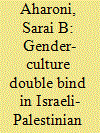| Srl | Item |
| 1 |
ID:
134148


|
|
|
|
|
| Publication |
2014.
|
| Summary/Abstract |
This article investigates structural conditions for women's inclusion/exclusion in peace negotiations by focusing on the linkage between acts of gender stereotyping and cultural framing. Through a narrative analysis of semi-structured interviews with Israeli negotiators and administrators who participated in official negotiations during the Oslo peace process, I link two recent claims about how gender may affect negotiators' understandings of strategic exchange: the gendered devaluation effect and the gender-culture double bind hypothesis. Building upon postcolonial feminist critique, I argue that narratives about women and cultural difference (a) demonstrate and engage with Israeli essentialist and Orientalist discourses about Arab culture and masculinity; (b) manifest how ideas about strategic dialogue and negotiations are gendered; and (c) convey how policymakers and negotiators may use cultural claims to rationalize women's exclusion from diplomatic and strategic dialogue. Furthermore, the study implies that dominant framings of Israeli-Palestinian negotiations as a binary East-West encounter need to be replaced by a more nuanced conceptualization of cultural identity that captures contextual aspects of difference, including the existence of military power and masculine dominance.
|
|
|
|
|
|
|
|
|
|
|
|
|
|
|
|
| 2 |
ID:
175783


|
|
|
|
|
| Summary/Abstract |
In September 2020, the Abraham Accords, signed by Israel, the UAE, and Bahrain, were published — the first official peace agreements between Israel and an Arab country since the peace treaty with Jordan in 1994. Although the Abraham Accords were presented by the signatories as an important milestone toward regional cooperation, they do not address the continued occupation or the rights of Palestinians, leaving the most controversial issues aside. Coincidently or not, they also fail to mention women and, as such, do not differ from previous accords signed by Israel in the 1990s in their approach to gender in terms of process, content, or discourse.
|
|
|
|
|
|
|
|
|
|
|
|
|
|
|
|